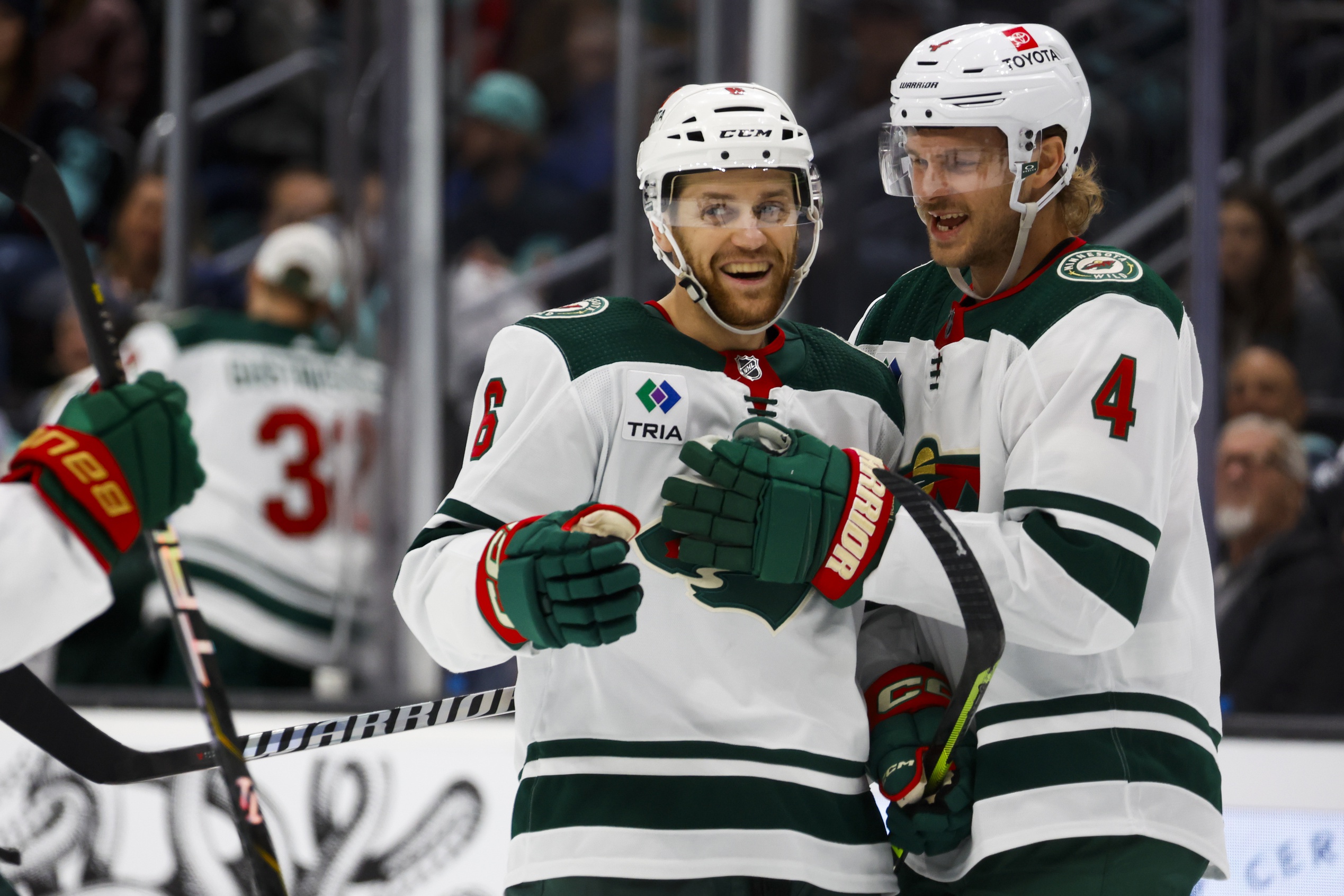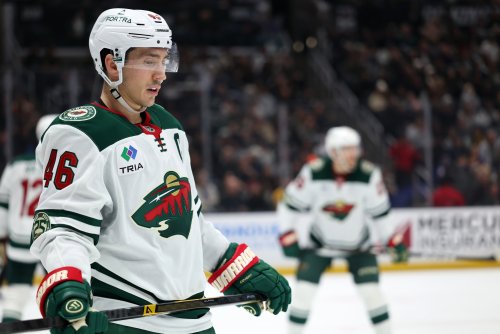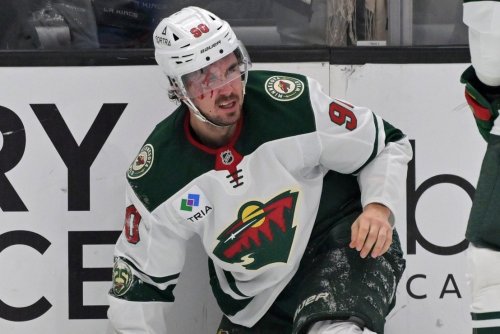
In May, Bill Guerin declared his goal wasn’t to make it to the second round because the NHL won’t put the Minnesota Wild’s name on the Stanley Cup for winning a playoff series. In October, he locked Marcus Foligno, Mats Zuccarello, and Ryan Hartman into long-term contracts with no-move clauses. At the season's midpoint, Guerin declared that he wouldn’t “wave the white flag” even though the Wild were outside the playoff picture.
Guerin’s point about the second round is that he didn’t construct the roster to only win one playoff series. He’s trying to build a contender. However, he’s locking veterans into long-term deals for cost certainty because he bought Zach Parise and Ryan Suter out. Therefore, the Wild have roughly $15 million in dead cap this year and next. Guerin said he wouldn’t give up on this season because he believes in the roster he’s built. Also, he can’t. He’s locked most of the players he’d trade into long-term deals.
Catch the Wild on the right day, and Guerin looks like a genius. They beat the defending champion Vegas Golden Knights on the road on February 12. Five days later, Joel Eriksson Ek and Kirill Kaprizov had hat tricks in a 10-7 win over the Western Conference-leading Vancouver Canucks. Last Friday, Minnesota beat Connor McDavid and the Edmonton Oilers in Alberta. The Wild have won seven of their last nine games since the All-Star Break and continue to hover close to the final wild-card spot.
How could Guerin not believe in this roster? How could anyone doubt them?
Because he’s created hockey’s most chaotic team. Catch them at the wrong time, and they look hopeless. The Wild lost seven straight games in November and got Dean Evason fired. They won their first four games under John Hynes before losing in Vancouver and Edmonton. Minnesota won its next four, then dropped eight of their next nine. They won three straight before the break but dropped crucial games to the Nashville Predators and Anaheim Ducks. The Wild beat Vegas and lost to the Buffalo Sabres; they stormed back to beat Vancouver and lost in Winnipeg.
We don’t know what the Wild are because they don’t have an identity. They’re offensive juggernauts one night and can’t score the next. They can hang with the best teams in the West, then lose to Anaheim and Buffalo. But the one constant is that this team seems to genuinely like each other. It helps that Guerin paid everyone. Winning and money make everyone happy, and the Wild seem to win enough to offset the frustration of their frequent losing streaks.
Still, it’s hard to say Guerin has done everything he can to build a good culture. Guerin “mutually parted ways” with his cap guy, and the NHL investigated Guerin for verbal abuse earlier this year. But the front office turmoil hasn’t seeped into Minnesota’s play on the ice. Whether the players moved on from the news quickly or have fully isolated themselves, they seem to navigate most of the adversity they face with aplomb.
But it might not be enough to get them into the playoffs. The Wild stacked the odds against themselves early by losing so frequently under Evason, then continued to compound the issue by playing inconsistent hockey. But they are resilient. That’s a trait any front office would want in its team. So why don’t more general managers take Guerin’s approach and lock everyone in?
In many ways, Guerin is acting out of necessity. He has chosen to try to build a winner while the team is in cap hell. Therefore, he values cost certainty. But imagine if Guerin had an extra $15 million to work with. He could have Kevin Fiala ($7.875 million cap hit), Matt Dumba ($3.9 million), and [italics] additional cap space. Hynes could put Marco Rossi on a line with Fiala when he has Kaprizov, Eriksson Ek, and Matt Boldy on the top line. Rossi would have a scoring wing on his line, and Dumba would shore up Minnesota’s blue-line depth.
I know that’s not how it works. The Wild wouldn’t have Brock Faber and his boundless energy eating up minutes if they hadn’t traded Fiala, and Dumba became a cap casualty. But the issue with Guerin’s approach isn’t that he overspent on Marcus Johansson, Alex Goligoski, and John Merrill. Every team has bad contracts. It’s that Guerin has no contingency plan. He’s tied Minnesota’s fate to Foligno, Zuccarello, Hartman, and Frederick Gaudreau, four players he could have moved at this year’s deadline.
The Wild easily could lose in the first round again. They’re a one-line team relying on 39-year-old Marc-Andre Fleury because Filip Gustavsson is having a down year. Minnesota could also miss the postseason altogether. It’s hard to win in the playoffs when an opposing team can dedicate all its resources to stopping Kaprizov’s line. We’ve seen that before. The only tried-and-true method for one-line teams to go on playoff runs is to lean on a hot goaltender. That’s a lot to ask of Fleury.
If this team loses in the first round for the eighth time in nine seasons or their season ends on April 18, the Wild will also have missed an opportunity to draft a scoring wing to pair with Rossi. Therefore, opponents will continue to focus on limiting Kaprizov. By locking many of his veterans into long-term deals, Guerin had to go all in on a flawed team without an identity. He had [italics] to believe in them. Missing the playoffs is a failure, given the opportunity cost of missing out on a high pick. So is losing in the first round.
Guerin has made reaching the second round the Wild’s Stanley Cup.
Think you could write a story like this? Hockey Wilderness wants you to develop your voice, find an audience, and we'll pay you to do it. Just fill out this form.
-
 2
2







Recommended Comments
Join the conversation
You can post now and register later. If you have an account, sign in now to post with your account.
Note: Your post will require moderator approval before it will be visible.